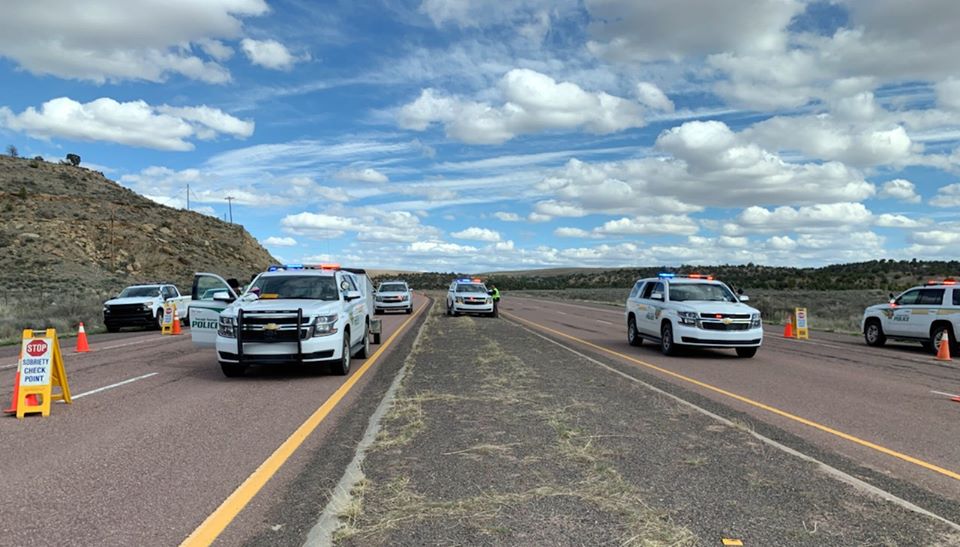
- Details
- By Native News Online Staff
WINDOW ROCK, Ariz. — On Friday, the Navajo Department of Health, in coordination with the Navajo Epidemiology Center and the Navajo Area Indian Health Service, reported 34 new COVID-19 positive cases for the Navajo Nation and two more deaths. The total number of deaths has reached 434 as of Friday.
Reports indicate that approximately 6,503 individuals have recovered from COVID-19. 76,367 people have been tested for COVID-19. The total number of COVID-19 positive cases for the Navajo Nation is 8,768.
Navajo Nation COVID-19 positive cases by Service Unit:
· Chinle Service Unit: 2,186
· Crownpoint Service Unit: 740
· Ft. Defiance Service Unit: 601
· Gallup Service Unit: 1,427
· Kayenta Service Unit: 1,235
· Shiprock Service Unit: 1,370
· Tuba City Service Unit: 810
· Winslow Service Unit: 396
* Three residences with COVID-19 positive cases are not specific enough to place them accurately in a Service Unit.
The Navajo Nation’s 57-hour weekend lockdown began on Friday, July 24 at 8:00 p.m. until Monday, July 27 at 5:00 a.m. All businesses on the Navajo Nation will be closed for the duration of the weekend lockdown.
“We are cautiously optimistic that our COVID-19 numbers on the Navajo Nation will continue to flatten as long as our people continue to wear masks, practice social distancing, stay home as much as possible, wash hands often, and avoid large gatherings. The states of New Mexico, Utah, and Arizona are seeing high numbers still and it’s a big challenge for their health care systems. Our health care system on the Navajo Nation will be devastated if we have another spike in cases, so please make good decisions and protect yourselves and your loved ones,” said Navajo Nation President Jonathan Nez.
On Friday, the state of Arizona reported 3,349 new cases of COVID-19, while New Mexico reported 317 new cases, and Utah reported 863 new cases. The Department of Health and the Health Command Operations Center is also preparing for the upcoming winter flu season, which will present more challenges, as well as a vaccination plan once a COVID-19 vaccine is proven to be safe and made available.
To Donate to the Navajo Nation
The official webpage for donations to the Navajo Nation, which has further details on how to support the Nation’s Dikos Ntsaaígíí-19 (COVID-19) efforts is: http://www.nndoh.org/donate.html.
For More Information
For more information including reports, helpful prevention tips, and more resources, please visit the Navajo Department of Health’s COVID-19 website. To contact the main Navajo Health Command Operations Center, please call (928) 871-7014.
For up to date information on impact the coronavirus pandemic is having in the United States and around the world, visit the Worldometers website.
For up-to-date information about COVID-19, Native News Online encourages you to go to Indian Health Service’s COVID-19 webpage.
More Stories Like This
Native News Weekly (August 25, 2024): D.C. BriefsNavajo Nation Mourns the Passing of Former Vice President Rex Lee Jim
Deb Haaland Earns Endorsement From Communications Workers of America Local 7076
University Soccer Standout Leads by Example
Two Native Americans Named to Democratic Congressional Campaign Committee's“Red to Blue” Program
Help us defend tribal sovereignty.
At Native News Online, our mission is rooted in telling the stories that strengthen sovereignty and uplift Indigenous voices — not just at year’s end, but every single day.
Because of your generosity last year, we were able to keep our reporters on the ground in tribal communities, at national gatherings and in the halls of Congress — covering the issues that matter most to Indian Country: sovereignty, culture, education, health and economic opportunity.
That support sustained us through a tough year in 2025. Now, as we look to the year ahead, we need your help right now to ensure warrior journalism remains strong — reporting that defends tribal sovereignty, amplifies Native truth, and holds power accountable.
 The stakes couldn't be higher. Your support keeps Native voices heard, Native stories told and Native sovereignty defended.
The stakes couldn't be higher. Your support keeps Native voices heard, Native stories told and Native sovereignty defended.
Stand with Warrior Journalism today.
Levi Rickert (Potawatomi), Editor & Publisher

